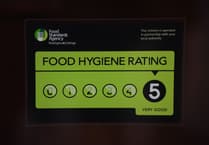A SURREY council worker said she has to “constantly beg” for money and cannot afford to fit a stairlift in her home on her wages.
Union members protested outside Surrey County Council’s offices last week, calling for an inflation-linked pay increase for staff.
Unison, which represents care workers, refuse collectors, social workers, teaching assistants, librarians, street cleaners and other staff at the council and local schools, has told senior managers at the authority it will prepare for a strike ballot if an improved pay offer isn’t forthcoming.
Surrey County Council budgeted for a 5 per cent increase to pay, staggered between 7.8 per cent and 4.5 per cent across all pay grades, while the union is calling for a 12 per cent inflation-linked increase, with a new minimum wage of £12 per hour.
Vikki Walton-Cole, a social worker for the county council, said because she worked she did not qualify for a grant to put a stairlift in her home, which she needs as a wheelchair user.
But with her wages just covering her bills each month she said she couldn’t afford to pay for one on top.
She said it wasn’t nice “as a working person to be forced to beg for charity” and said Unison, where she is also disabled members officers and co equalities officer, was calling for a pay offer which meant people wouldn’t have to “rely on charity”.
“No one wants to rely on charity,” she said.
“As a disabled person, I’m forced to constantly beg for finances or funds all over the place.”
Pointing to figures from the charity Scope, which said the average disabled household faced just under an additional £1,000 per month in costs to live, Vikki said she could earn more working for West Sussex County Council than in Surrey.
She claimed it also cost “a hell of a lot more” to live in Surrey, but admitted a move probably wasn’t possible for her.
“My support is already in Surrey where I live,” she said. “As a disabled person, it’s really important to have as good medics, support and that around you as possible.
“My partner and I, our families live in the area and it would move us away from some very vital support.”
Tom Marr is also a social worker, in adult social care, and his work can involve “quite emotionally charged situations” including assessing people in care homes, or in their own homes, dealing with families, and safeguarding situations.
He said for him the job meant on a given day he could have “made a difference in someone’s life” and made things easier or safer for them.
Tom questioned the county council’s claim that the pay award being offered would prioritise the lowest-paid members of staff.
He said since the pandemic, staff had been working “extremely hard” and were being asked to “do more and more effectively, for less and less”.
Ellie Waple, 21, works in what she describes as the county’s “massively underfunded” library service.
The union’s young members’ officer said without the “vital” service, some residents may not have computer or internet access, or even reading material.
Ellie said: “Without vital services and without libraries, we will suffer as a community as a whole.”
She added that for younger union members, some just coming out of education or going into higher education: “They need to be able to afford to live and without this pay offer they won’t be able to do that.”
The council’s leader, Cllr Tim Oliver, said it was “disappointing” the offer had been rejected by the union but that the council “recognised the impact of the current cost of living pressures on hard working and dedicated staff”.
Cllr Oliver said the council had worked “really hard” to find extra money for staff pay this year and that for the second year running the council was focusing the largest percentage increases on its lowest paid employees “to reflect the increased costs staff are facing day by day.”
He said a Surrey minimum wage of £11.05 per hour, 15p per hour higher than the Real Living Wage, represented an increase of 16.3 per cent over the past two years for staff on the lowest pay grades.
Cllr Oliver added: [This] is in addition to a one-off lump sum payment for business mileage and a Real Living Wage adjustment for lower paid staff paid in January this year.
“However, it’s imperative that the offer is within our means.
“The council is not immune to the challenges of the current economic landscape, rising costs and inflation pressures.
“Put simply everything is more expensive for us to buy as a council too, and we must ensure we remain in a position to deliver vital public services and protect the most vulnerable in our communities throughout.
“It’s within this context that discussions will continue, and we will be reviewing our next steps accordingly.”



